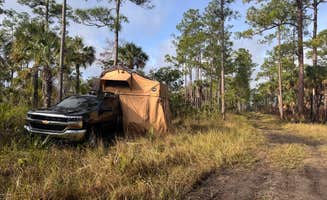Big Cypress National Preserve offers rustic camping near Estero, Florida with limited options for backcountry experiences. Located within the watershed of South Florida, this preserve protects over 729,000 acres of freshwater swamp ecosystem. Summer temperatures regularly exceed 90°F with high humidity, while winter months bring cooler, drier conditions ideal for primitive camping adventures.
What to do
Wildlife viewing opportunities: Visitors to Nobles Primitive Camp can observe native Florida wildlife in their natural habitat. The camp's proximity to marshland creates ideal conditions for spotting wading birds, small mammals, and occasionally Florida panthers from a safe distance.
Stargazing sessions: The remote nature of backcountry camping sites provides minimal light pollution. Night skies reveal constellations clearly, especially during winter months when humidity levels decrease and visibility improves.
Hiking trails exploration: Multiple unmarked paths branch from primitive camping areas. Proper navigation tools are essential as trail markings may be minimal in backcountry regions. Waterproof boots recommended year-round due to frequent standing water on trails.
What campers like
Authentic wilderness experience: The isolation of Carpenter Primitive Camp appeals to those seeking genuine backcountry camping. The absence of facilities maintains the natural environment without modern intrusions.
Diverse ecosystem access: Campers appreciate direct access to Florida's unique subtropical terrain. The transition zones between cypress stands and open prairie provide opportunities to observe diverse plant communities within short walking distances.
Quiet surroundings: Unlike developed campgrounds, these primitive sites offer significant distance from road noise and other campers. Sound carries differently in the preserve environment, with natural acoustics dominated by wildlife calls rather than human activity.
What you should know
Seasonal accessibility changes: Access roads to primitive sites deteriorate significantly during summer rainy season (May-October). Four-wheel drive vehicles strongly recommended during these months as even gravel roads may become partially submerged or muddy.
Permit requirements: All backcountry camping requires permits from Big Cypress National Preserve offices. Permits must be obtained in person at visitor centers during operating hours. Maximum stay limits apply and vary seasonally.
Supply planning essential: No water sources available at primitive sites means carrying all necessary drinking water. Plan for at least one gallon per person per day, with additional water for cooking and cleaning. No resupply options exist within walking distance of camps.
Tips for camping with families
Age appropriateness: The primitive nature of Nobles Primitive Camp makes it better suited for older children with previous camping experience. The lack of facilities presents challenges for families with very young children.
Wildlife safety protocols: Teach children proper food storage techniques before arrival. All food items must be secured in sealed containers and never left unattended to prevent wildlife encounters.
Navigation backup plans: Ensure multiple family members understand the route to and from camping locations. Cell service is unreliable throughout most of the preserve, making physical maps and compasses necessary backup tools.
Tips from RVers
No RV access available: The primitive camps within Big Cypress National Preserve are accessible only by foot. No vehicle camping allowed at these backcountry sites.
Nearest RV alternatives: RVers seeking proximity to the preserve must use established campgrounds outside the immediate area. The closest options with hookups are approximately 30 miles away in Naples or Everglades City.
Day-use strategies: RV travelers can park at designated day-use areas and hike to primitive camps for overnight stays while maintaining their RV at an established campground. This allows experience of rustic camping near Estero while keeping RV comforts accessible.


